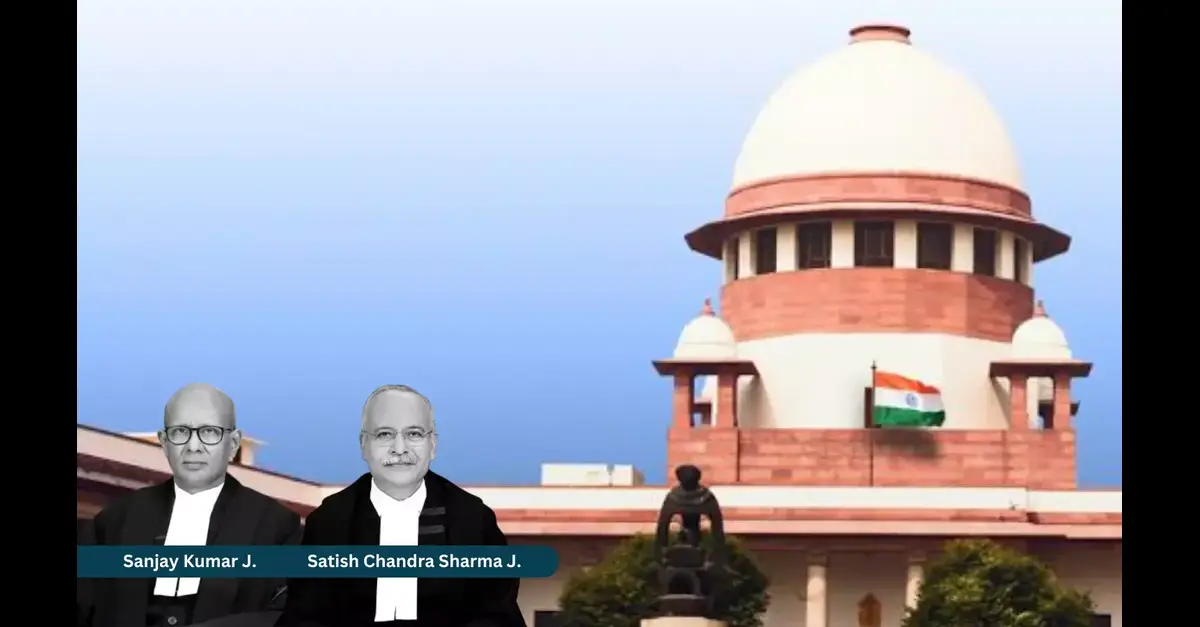Case name: Union of India & Ors. v. R. Shankarappa
Case number: SLP(Civil) No. 7149 of 2023
Judgment date: 25.07.2025
Bench / Judges: Justice SANJAY KUMAR, SATISH CHANDRA SHARMA
Introduction
This issue came out of a dispute between what bodies may issue charge sheets under the Central Civil Services (Classification, Control Appeal) Rules, 1965 (CCS CCA Rules). The respondent was R. Shankarappa a retired Sub Divisional Engineer of the Department of Telecommunications (DOT) which challenged the disciplinary action brought forth against him. The Karnataka High Court which had set aside the Central Administrative Tribunal (CAT)’s decision also held that a charge sheet put forth for major penalties under Rule 14 required sanction of an authority which may mete out such major penalties. The Union of India took the matter to the Supreme Court which in turn reversed the High Court’s judgment.
Issues for Determination
Whether a discipline panel that is authorized to mete out only minor penalties may issue a charge sheet under Rule 13 of the CCS CCA Rules which deals with major penalties?
Did the Karnataka High Court properly base its decision on B.V. Gopinath v. Union of India which it did in the case of invalidating the charge sheet?
Did the processes in which the respondent was put through procedurally fair?
Legal Provisions Involved
Rule 13 of the 1965 CCS CCA Rules Authority to institute disciplinary proceedings.
Rule 14, in the 1965 CCS CCA Rules Procedure for imposition of major penalties.
Appendix 3, CCS CCA Rules of 1965 Outlines which authorities have the power to do out penalties.
In the context of criminal cases Sections 7 and 13 of the Prevention of Corruption Act of 1988.
Appellant’s Arguments
The Union of India put forth that the General Manager (Telecommunications) was fully within his rights under Rule 13(2) of the CCS CCA Rules to bring forward disciplinary action even which the final penalty was not a part of his brief. Appellants presented that the High Court’s appeal to B.V. was unfounded.
In Gopinath v. Union of India it is to be noted that the facts and departmental rules were different. It was put forth that in the DOT there is no provision which requires prior approval from the Member, Telecommunications Commission for issue of a charge sheet under Rule 14. The CAT had properly up held the charge sheets which were issued as the initiation and inquiry processes were carried out by the proper authorities.
Respondent’s Arguments
The complainant brought up that the issue of the charge sheet which brought about the major penalties was beyond the General Manager’s authority which is only to do out minor penalties. Also the issue of the charge sheet was a jurisdictional defect.
He put forth that the High Court’s decision in the case of B.V. Gopinath was right which is similar to this case in that a higher authority’s ok was required to institute actions for major penalties. Also he went to court for the High Court’s ruling which struck down the disciplinary action.
Court’s Analysis
The Supreme Court looked at in detail the put forward rules of the CCS CCA Rules which included Rule 13(2), Rule 14 and Appendix 3. It was reported that Rule 13(2) in fact does allow a disciplinary body which is able to hand out small penalties to bring forward cases of great penalties. Also the Court put aside the case of B.V. Gopinath which had a requirement of prior ministerial approval which was a feature of the Income Tax Department and based on an internal office instruction. In the present case of the DOT no such office instruction or statuary requirement was present. Also the Court did not find any procedural impropriety in the disciplinary investigation. The charge sheets which were issued by the General Manager (Telecommunications) were found to be valid and the ultimate penalty notice was passed by a proper authorized body.
Judgment
The Supreme Court has allowed the appeal and has set aside the judgment of the Karnataka High Court dated 18.11.2022 in Writ Petition No. 14475 of 202 also reported that the Court which up held the order of the CAT and which in turn confirmed that the charge memos dated 27.05.2006 and 01.12.2008 issued by the Principal General Manager, BGTD, Bengaluru are valid. It was put forth that the High Court’s interpretation which we adopt brought in unnecessary technical issues and was at odds with the scheme of the CCS CCA Rules.
Conclusion
The Supreme Court held that in case of Rule 13(2) which allows an authority which is empowered to mete out minor penalties to issue charge sheets for major penalties it is a premise that the main penalty will be imposed by the higher authority. Also the judgment puts forth that departmental actions are to be judged within the structure of the applicable rules and not by bringing in requirements from separate cases.
PRIME LEGAL is a full-service law firm that has won a National Award and has over 20 years of experience in various sectors and practice areas. Prime Legal falls into the category of best law firm, best lawyer, best family lawyer, best divorce lawyer, best criminal lawyer, best criminal law firm, best consumer lawyer, best civil lawyer.”
WRITTEN BY AYUSHI TRIVEDI


